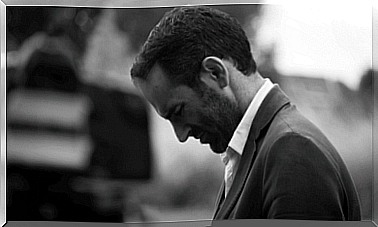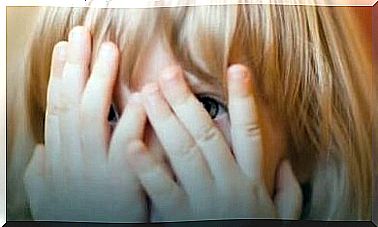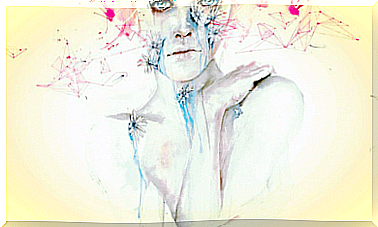Hodophobia Or Fear Of Traveling: What Is It?
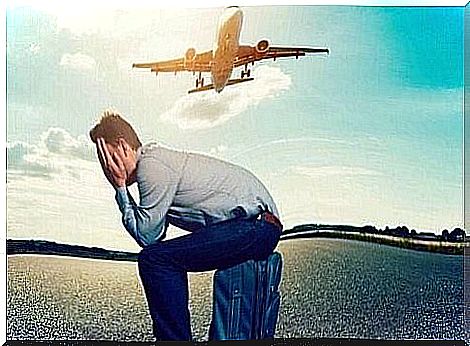
Anxiety about having to be far from home, from your city and from everything you know. Fear of the idea that something might happen to you while you are away from home. Nausea, sweating and fast heartbeat when you get on a train or a plane… Does all this seem unrealistic to you? Hodophobia, or fear of traveling, is actually a disorder that affects the sufferer throughout life.
Of course, it is true that most people associate travel with enriching experiences and try to get away as often as possible. Escape from the routine and getting to know new places can be an excellent way to unwind.
However, some people do not see it that way. Some people really panic at the thought of leaving everything that gives them a sense of security. But sometimes it is necessary to travel, for example for work or family.
The anxiety that an affected person feels in that situation can be extremely debilitating. After all, phobias are something strange for those who do not suffer from them (and can not understand them). However, they can be devastating to those who experience them in their daily lives. Let’s take a closer look.

Hodophobia or fear of travel: definition, symptoms, causes and treatment strategies
Hodophobia, or fear of traveling, has existed and been a part of life for a long time. Not everyone feels safe when they leave the comfort zone. Getting on certain means of transport and getting to new, unknown places that are out of their control can make patients feel worried, anxious and scared.
You may now be interested to note that this is a specific type of phobia that is classified in the DSM-5 ( Diagnostic and Statistical Manual of Mental Disorders ). It is an irrational and crippling fear that can limit the social, personal and work aspects of the person’s life.
However, hodophobia affects sufferers in different ways. Some may feel afraid to use certain types of transportation. Others may feel anxious just at the thought of traveling far from home, and some fear unfamiliar environments. Obviously, many patients have to deal with all these different aspects.
While it may seem strange that someone does not like to travel, do not forget this point. Phobias affect one in 23 people. They are the most common mental illness, and you probably know someone who suffers from a debilitating phobia.
What are the symptoms?
As with all phobias, you can identify the fear of traveling by the varied emotional, cognitive and even physical symptoms. Let’s look at the most common symptoms.
Emotional signs
- Fear of having to use some form of transportation that takes you far from home.
- The feeling that something bad will happen during the trip.
- Anxiety about the idea of putting everything that is safe behind you.
- To be ashamed to tell others how you feel.
Cognitive symptoms
- Difficulty organizing everything travel-related. Your thoughts may overwhelm you when you arrive at the airport or when you take a train.
- You imagine a thousand different negative situations. For example, accidents, getting lost on the road, being robbed, not finding the hotel, etc.
- Problems thinking about other things in the days or weeks before you travel.
- Confusion or mental blockages.
Physical symptoms
- Nausea
- Abdominal pain or upset stomach
- Vomiting
- Fast pulse
- Sweat
- Panic attacks
What are the causes of hodophobia or fear of traveling?
Getting to know the exact cause of a phobia can be very complex. Studies such as the one conducted by the Timone Neuroscience Institute in France show that these disorders tend to be based on one of the following two sources:
- Phobias can stem from a trauma. For example, hodophobia or fear of traveling may be due to a bad experience, such as being a victim or witnessing a terrorist attack on a previous trip.
- On the other hand, a phobia can start without a specific or obvious cause. Genetic, familial, environmental or developmental factors play an important role in the development of phobias.
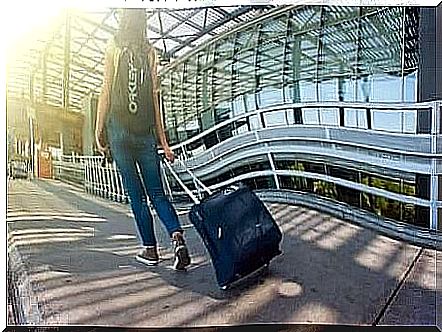
How can you deal with the fear of traveling?
Hodophobia tends to be associated with other phobias, such as a fear of flying. In extreme cases, it may even be related to agoraphobia. However, it is more often associated with generalized anxiety disorder (GAD).
People who suffer from GAD often find themselves in complex situations that they have difficulty coping with. With that in mind , it is very important to get an accurate diagnosis. When it comes to treatment, it is good to use different approaches at the same time. For example, anti-anxiety medications may be helpful, along with other treatment options.
Psychological therapy is also beneficial. Psychologists can use the following strategies:
- Progressive exposure to what triggers the phobia. Exposure therapy consists of bringing the person into contact with the situations that cause anxiety to help the patient deal with their feelings and thoughts. This technique is more successful when it is part of cognitive behavioral therapy.
- Cognitive restructuring. It is aimed at combating a person’s destructive thoughts and ideas.
- Relaxation and breathing techniques.
To conclude , it is important not to underestimate someone’s fears, especially when it begins to negatively affect their lives. All phobias are the result of anxiety disorders that need to be treated. If not, the person’s ability to function is affected.
